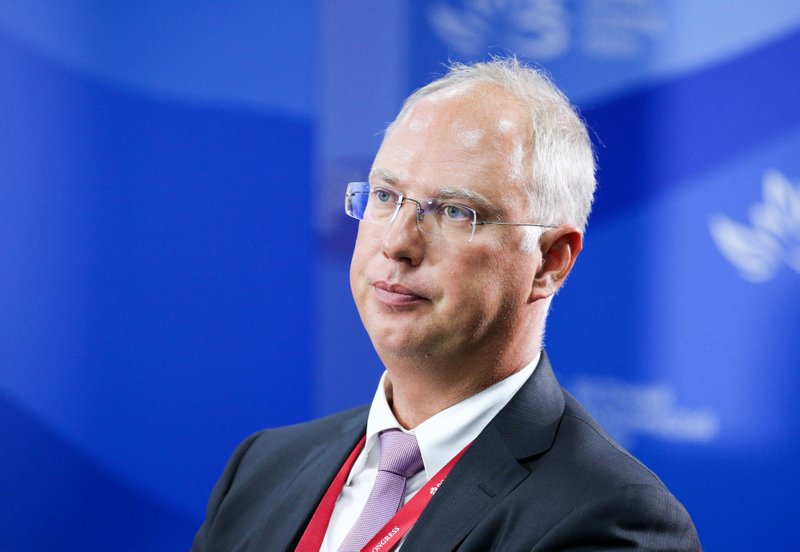Shortly after news emerged that Hillary Clinton had phoned Donald Trump to concede the presidential election early on Nov. 9, 2016, the head of Russia's sovereign wealth fund received a message from New York: "Putin has won."
The exchange recorded in special counsel Robert Mueller's report, in which the name of Kirill Dmitriev's contact has been redacted, captures the jubilation among Kremlin insiders over Trump's victory after what U.S. intelligence said was a campaign of Russian interference designed to help the underdog. The win set in motion what the report called a "flurry of Russian activity" among businessmen to establish contact with the president-elect's team.
Mueller's report, which includes details of Dmitriev's private correspondence and an interview with billionaire investor Petr Aven, offers a rare glimpse into how President Vladimir Putin uses leading businessmen to act as informal Kremlin emissaries, meeting regularly with them to give directions.
"Aven said that he took these meetings seriously and understood that any suggestions or critiques that Putin made during these meetings were implicit directives, and that there would be consequences for Aven if he did not follow through," Mueller said in the report. "Although Putin did not expressly direct him to reach out to the Trump Transition Team, Aven understood that Putin expected him to try to respond to the concerns he had raised."
Aven disclosed that at one of his quarterly private meetings with Putin shortly after the election, the president "indicated that he did not know with whom formally to speak" in establishing contact with the incoming U.S. administration. After Putin warned of the risk of more U.S. sanctions against Russian companies, Aven said he'd take steps to protect his business including by trying "to establish a line of communication" to Trump's team, according to the report.
"It's an open secret that oligarchs are an important tool not only domestically but in Russia's foreign policy," Valery Solovei, a political scientist at the Moscow State Institute for International Relations, said. "The merit of the Mueller report is that he exposes this, showing how it functions."
The Kremlin confirmed Friday that Putin received reports on some of the communication between Russian businessmen and Trump's representatives. It's "standard practice" for the president to meet with major businessmen, Putin's spokesman, Dmitry Peskov, said.
Aven testified to the Mueller team that he is one of about 50 leading businessmen, often described as oligarchs, who meet regularly with Putin.
He controls Russia's largest private bank, Alfa-Bank, and was partners with a major Republican donor, Soviet-born U.S. citizen Len Blavatnik, and Russian businessman Viktor Vekselberg in the TNK-BP oil company before they sold their stake to state-owned Rosneft PJSC in 2013 for $27.7 billion.
Neither Blavatnik nor Vekselberg, who was placed under Treasury Department sanctions last year, are mentioned in the unredacted sections of Mueller's report. Aven's proceeds from that deal, together with several other billionaires who cashed out of the joint venture with British Petroleum (BP of TNK-BP), were largely invested into the Luxembourg-based LetterOne holding.
After Aven's meeting with Putin and a separate gathering between the Kremlin leader and the country's most prominent businessmen in December 2016, Mueller's report details how the billionaire attempted to reach out to Trump's transition team through Richard Burt, a former U.S. ambassador to Germany who sits on LetterOne's board.
Burt told Aven in an email, using the code word "project A," that his efforts had failed and Aven reported this to Putin at their next quarterly meeting early in 2017 when the president had asked about his attempts to contact Trump's team.
"Putin continued to inquire about Aven's efforts to connect to the Trump administration in several subsequent quarterly meetings," according to Mueller's report.
Aven said he also told the Kremlin's chief of staff, Anton Vaino, that he'd been subpoenaed by the FBI and questioned on whether he'd tried to create a back channel between the Russian government and the Trump administration. Aven said Vaino "did not appear to care," according to the report.
Aven's description of his contacts with Putin was consistent with Dmitriev's behavior, Mueller wrote. The report identified the sovereign wealth fund chief as among the insiders who tried "to make inroads" with Trump's team at the behest of senior Kremlin officials. Dmitriev repeatedly described Putin as his "boss" in his dealings with Americans, it said.
In one instance, Dmitriev presented a plan to improve Russian-U.S. relations to Rick Gerson, a hedge fund friend of Trump's son-in-law, Jared Kushner, that was later circulated to other top administration officials.
"Dmitriev told Gerson that he had been tasked by Putin to develop and execute a reconciliation plan between the United States and Russia," Mueller's report stated.
Despite the frenetic activity by Russian businessmen to open channels of communication with Trump, the report shows little evidence they succeeded.
Information for this article was contributed by Irina Reznik of Bloomberg News.
A Section on 04/20/2019

